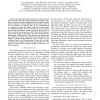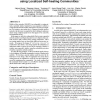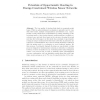258 search results - page 9 / 52 » Non-cooperative routing in loss networks |
ICWN
2004
13 years 9 months ago
2004
A critical issue in the design of routing protocols for wireless sensor networks is the efficient utilization of resources such as scarce bandwidth and limited energy supply. Many ...
INFOCOM
2012
IEEE
11 years 10 months ago
2012
IEEE
—By exploiting reception diversity of wireless network links, researchers have shown that opportunistic routing can improve network performance significantly over traditional ro...
MOBIHOC
2005
ACM
14 years 7 months ago
2005
ACM
Mobile ad hoc networks (MANETs) are vulnerable to routing attacks, especially attacks launched by non-cooperative (selfish or compromised) network members and appear to be protoco...
EWSN
2009
Springer
14 years 8 months ago
2009
Springer
The low quality of wireless links leads to perpetual packet losses. While an acknowledgment mechanism is generally used to cope with these losses, multiple retransmissions neverthe...
CORR
2010
Springer
13 years 7 months ago
2010
Springer
Opportunistic routing is a multi-hop routing scheme which allows for selection of the best immediately available relay. In blind opportunistic routing protocols, where transmitters...



